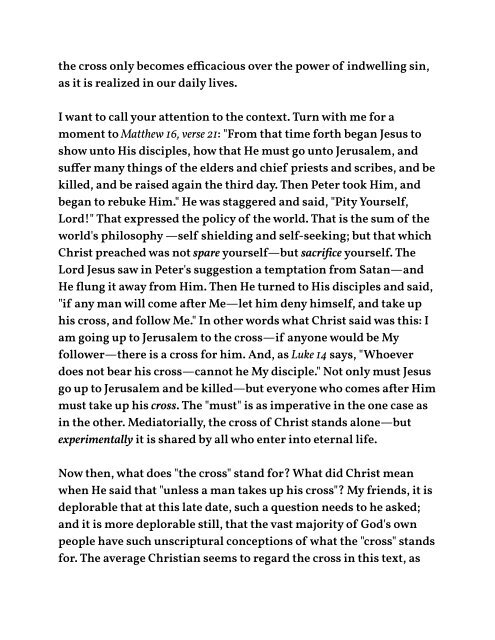Cross-Bearing
Arthur Pink studied briefly at Moody Bible Institute, pastored churches in the USA and Australia, and returned to England in 1934. His last 12 years were in Lewis, Scotland, writing the Studies in the Scriptures, his monthly expository digest, issued from 1922 to 1953. His focus was on the great themes of grace, justification, and sanctification.
Arthur Pink studied briefly at Moody Bible Institute, pastored churches in the USA and Australia, and returned to England in 1934. His last 12 years were in Lewis, Scotland, writing the Studies in the Scriptures, his monthly expository digest, issued from 1922 to 1953. His focus was on the great themes of grace, justification, and sanctification.
Create successful ePaper yourself
Turn your PDF publications into a flip-book with our unique Google optimized e-Paper software.
the cross only becomes efficacious over the power of indwelling sin,<br />
as it is realized in our daily lives.<br />
I want to call your attention to the context. Turn with me for a<br />
moment to Matthew 16, verse 21: "From that time forth began Jesus to<br />
show unto His disciples, how that He must go unto Jerusalem, and<br />
suffer many things of the elders and chief priests and scribes, and be<br />
killed, and be raised again the third day. Then Peter took Him, and<br />
began to rebuke Him." He was staggered and said, "Pity Yourself,<br />
Lord!" That expressed the policy of the world. That is the sum of the<br />
world's philosophy —self shielding and self-seeking; but that which<br />
Christ preached was not spare yourself—but sacrifice yourself. The<br />
Lord Jesus saw in Peter's suggestion a temptation from Satan—and<br />
He flung it away from Him. Then He turned to His disciples and said,<br />
"if any man will come after Me—let him deny himself, and take up<br />
his cross, and follow Me." In other words what Christ said was this: I<br />
am going up to Jerusalem to the cross—if anyone would be My<br />
follower—there is a cross for him. And, as Luke 14 says, "Whoever<br />
does not bear his cross—cannot he My disciple." Not only must Jesus<br />
go up to Jerusalem and be killed—but everyone who comes after Him<br />
must take up his cross. The "must" is as imperative in the one case as<br />
in the other. Mediatorially, the cross of Christ stands alone—but<br />
experimentally it is shared by all who enter into eternal life.<br />
Now then, what does "the cross" stand for? What did Christ mean<br />
when He said that "unless a man takes up his cross"? My friends, it is<br />
deplorable that at this late date, such a question needs to he asked;<br />
and it is more deplorable still, that the vast majority of God's own<br />
people have such unscriptural conceptions of what the "cross" stands<br />
for. The average Christian seems to regard the cross in this text, as

















